#so i think the gnc label would be appropriate for her at this point too
Note
Hi hello sorry if this is a weird question but is Kelly McCormack publicly out as queer in any way? I’ve seen posts that refer to her as lesbian but from the little search I did I haven’t found much, allthough obviously that doesn’t really mean much.
Obvs it doesn’t matter either way I was just curious because I am deep down the brain rot rabbit hole at this point and I find the way she speaks about jess/queerness on the show so tender and compelling! She clearly cares so much
could not agree more re: how much she cares! she definitely puts so much thought and love into her work.
to my knowledge, she hasn't ever identified herself with any particular label, but she does talk about how much she loves women in multiple interviews, including this one where she talks about how evil ariel in the little mermaid gave her confusing feelings about women for the first time, and also about being affected by the take on gender/genderlessness in the left hand of darkness by ursula k le guin. which is all very lgbt of her
in another interview i think she says something like "women are my love, my muse" as well. so basically it seems that she is definitely a woman liker and enthusiast, tho she has not explicitly "come out" as anything specifically.
#hope this was helpful!#she has also talked about presentation and being kind of alienated from traditional femininity#and how early in her career she had to try to fit more into a role of hyper femininity in order to get more work#so i think the gnc label would be appropriate for her at this point too#especially how she talks about jess and how she always wants to be like feral and covered in dirt#i hope we get aloto season 2 and more bts and cast interviews tbh bc having this very lgbt cast is so cool#and i love hearing some of the stuff they have to say#ask#anonymous
9 notes
·
View notes
Text
I don't know how big the overlap is between "people who need to hear this" and "people who will actually read this" but look. I grew up in a conservative Christian family. I had to fight my parents for years about my gender identity.
I came out as nonbinary first because I thought, for some reason, that that would be more palatable to them than being "all the way trans." It was not. Instead I got "this is mental illness" and "I would understand if you just thought you were a man."
So you'd think they would be thrilled when I eventually came out as a trans man, right? Wrong! Then it was "You're too sensitive to be a man" and "We can't tell your tomboy cousin about this, it might give her ideas" and "You're just looking for unsolvable problems."
I was having my gender challenged and undermined on a regular basis for years, by the people I was supposed to be able to trust. I leaned hard into being capital-M Male, I hated my body, I hated my voice, and I could tell my own internalized transphobia was making me uncomfortable with nonbinary people and gender non-conforming trans men.
And you know what I did? I KEPT IT TO MYSELF. I didn't seek out nonbinary people's posts to harass them. I didn't tell other trans men they shouldn't wear makeup or dresses. I did what I needed to do to feel as okay as possible with MY OWN BODY and MY OWN GENDER EXPRESSION. I got away from my shitty family. I got on hormones. And that all sounds simple but it took time and effort and money, and biting my tongue to get what I needed from transphobic people who had resources that I lacked.
You know what happened almost as soon as I got away from my family, and started seeing the changes I'd most craved from HRT? I stopped identifying as male. It took me a long time to come to terms with, because I'd had to fight so hard for that label, but as soon as I didn't live with people I'd been conditioned to be dependent on and who kept trying to shove me into one specific box, and as soon as strangers stopped automatically associating me with the label that had been forced on me all my life, a whole world opened up.
I'm nonbinary. And I'm finally happy about it. And I'm not saying every trans person out there slinging anti-nonbinary rhetoric is really suppressing their own identity. I'm not saying most or even half of them are. But I can almost guarantee some of them are. And even the ones who aren't are alienating a huge chunk of their own community.
The cis gatekeepers you are trying so desperately to align yourself with do not respect you as a full human being. The sooner you understand that, the sooner you stop lashing out at other trans people, the less complicated it's going to be for you.
Think about why you're uncomfortable with nonbinary people, or gnc trans people, or people who aren't "dysphoric enough," etc etc. Why are you drawing these arbitrary lines in the sand?
Gender is an incredibly subjective experience and there is no point in trying to regulate how other people express theirs. As long as they're not appropriating someone else's culture, or leaning into misogyny to accentuate their maleness, etc. Nonbinary people are not your enemy.
#transphobia#internalized transphobia#nonbinary#sorry this is kind of dfabcentric#i can only speak from my own experience
8 notes
·
View notes
Text
Review #1: Animal Crossing: New Horizons (ACNH)
With Isabelle as my avatar, this only felt appropriate as my first review! (Please note that I am speaking only to the content of the game itself, not the fanbase, fan works, or other unofficial things.)
System: Nintendo Switch
Summary: Play as one of the first residents moving to a deserted island. There, you can engage in activities such as making friends; catching bugs, fish, and sea creatures; filling out your museum; creating clothing, flags, and town tunes; decorating your house; and gardening.
Overall: ACNH presents somewhat of a utopia for many of us: freedom and safety. Beyond that, it’s cute and the islanders have many funny lines. There are also many things for you to collect, but there’s nothing forcing you to engage in parts of gameplay that don’t interest you once you’ve done enough to unlock everything. Gendered personality types and a lack of variety in female NPCs remain, but allowing your character to be as GNC as you’d like is a nice step toward removing gender roles.
---
Tests (see terms list for explanation):
Anti-Freeze: Pass. No characters are injured or killed, barring the player character hitting them with a net or something.
Bechdel: Pass, to the small extent NPCs talk to one another.
Mako Mori: N/A as there are no narrative arcs.
Sexy Lamp: Pass, although there’s no real plot.
Please choose your style.
Let’s start with a big talking point in certain circles: “Please choose your style.” In the original -- and most likely every single version of the game except English -- this was a choice between playing as a boy or a girl. They changed it in English due to threats and harassment from TRAs.
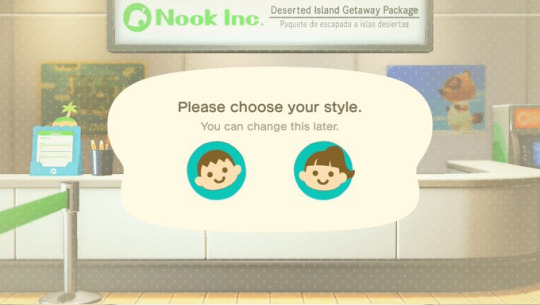
[the choice as it appears in English: “Please choose your style. You can change this later.”]
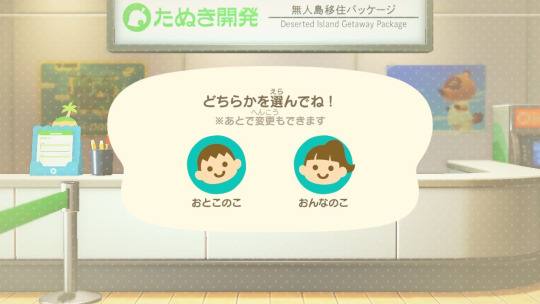
[the choice as it appears in Japanese: “Please choose one! *You can change this later. boy / girl”]
The odd thing about the fuss around this is that it actually functionally does not matter whatsoever. I don’t think I’ve seen it come up even once in dialogue. That said, I’m not sure if other languages’ versions have characters refer to your character’s sex. On the bright side, it does mean that male and female player characters would be talked to and about in the same way. On the other hand, there was never a problem of animals treating you differently based on your sex in previous games anyway that I ever saw, so to see it that way is fixing a problem that didn’t exist in the first place.
I’ve noticed that the animals will use “they” to refer to someone they’re talking about. My guess is actually that this is an ease of programming thing rather than a woke thing. Because Japanese uses personal pronouns quite infrequently, and some of the lines are random ‘fill in the blank with a random islander name’ types of statements, sometimes previous English releases ran into a problem where the translators had no way to know whether the character would be referring to a man or a woman, and iirc, seemed to go with male by default... Ironically, using “they” is incorrect 100% of the time, though.
Self-Expression
Unlike previous games in the series, your character’s facial features and beginning hairstyle options are not determined by your character’s sex. It’s a nice change of pace that your character can be as GNC as you’d like from the beginning, although your starting outfit may be somewhat gendered. You also can freely change between hairstyles and facial features whenever you want once you’ve acquired a mirror, so you aren’t locked into one type of self-expression.
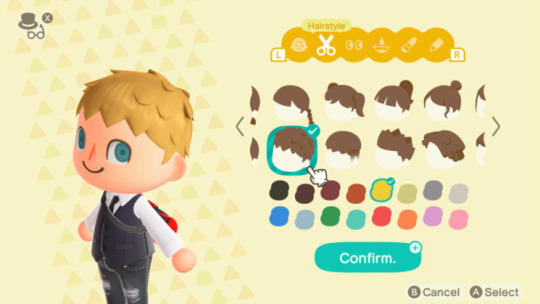
Also, any player character can wear any outfit without commentary. In New Leaf (the previous main-series game), you could wear anything as well, but some clothing options were gendered. For example, Labelle (the porcupine who sold accessories) might say things along the lines of, “That’s made for women, [player name], so it’ll look good on you!” or “That’s usually made for men, but I bet you can pull it off, [player name]!” In New Horizons, these lines are no longer present, at least that I’ve seen in the English version.
In terms of self-expression, I see these as strengths. There’s nothing in the game that encourages or discourages “feminine” or “masculine” expression for anybody.
Gendered Personalities
While gender roles do not apply to the player character, they can be seen in the NPCs.
One thing I will say in the series’ defense is that in the Japanese versions of the game, every personality type uses a different personal pronoun. In Japanese, personal pronouns are almost all quite gendered and, in fiction, tell you a lot about the character’s personality. It would actually feel a bit formal and odd to have all the characters use ‘watashi’ (a less gendered personal pronoun, but for men I think it’s a bit formal). Each personality type has a different pitch to their voice, with higher pitches for female personalities and lower pitches for male personalities, too. None of these are insurmountable barriers if they committed to breaking free of these stereotypes, but they are relevant factors.
The personality types are as follows:
Normal (F): Friendly and kind characters who want to help you out.
Peppy (F): Cheerful, energetic characters. They may come across a bit “ditzy.” They dream of being idols (actresses/singers in English).
Snooty (F): Haughty, vain characters who value fashion and beauty. They can be standoffish at first, but are loyal friends once you’ve gotten close to them.
Big Sis (F): Similar to normal types, but more mature.
Jock (M): Athletic characters who are obsessed with sports and muscles. They can often come across as lacking in intelligence and one-dimensional.
Cranky (M): Rude, standoffish characters, though they can be protective and kind once you’ve befriended them.
Lazy (M): Most likely self-explanatory. Lazy characters want to lounge about and not work too hard, mentally or physically.
Smug (M): Conceited, ostensibly "charming” characters.
Overall, the female personalities are kinder and more intelligent. However, even this “positive stereotyping” is still putting us in a box, and these “personalities” are indeed very much stereotypes.
The situation with special characters (shopkeepers and such) aren’t much better. There are a variety of male special characters with a variety of different traits: intelligent with good business sense, sneaky, timid, friendly, daydreamer, cheerful, artistic... Meanwhile, female special characters are basically sweet, shy, and/or fashionable. The only exceptions that come to mind are Saharah (who was a man in the Japanese version, but changed to a woman back in the original GameCube game due to long eyelashes, I can only assume) and Luna (who has so few lines it’s hard to even describe her personality).
On the bright side, ACNH did get rid of the gendered speech bubbles. It used to be that male villagers’ names would have a blue background and female villagers’ would be pink, save for special characters for whom it would be green. Now in ACNH, the color seems to be determined by the character’s aesthetic, which is a nice change.
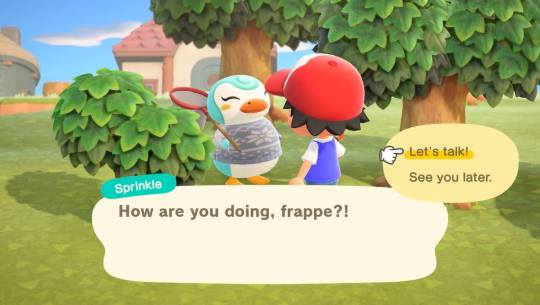
Little to No Sexualization
Unlike many forms of media, ACNH is pretty free of sexualization as far as official content goes. (Obviously the internet is another story entirely, but that’s not Nintendo’s fault.) Only one character has any form of secondary sex characteristics (Luna has breasts), and while I question the need to give a tapir breasts, her outfit is modest, there are no “jiggle physics,” and there are no sexualizing camera angles or dialogue.
I’ve heard that the smug characters flirt with the player character. I don’t like them so I can’t say with confidence whether this remains true in ACNH, but as far as I saw in New Leaf, all they said in that regard would be like “you’re looking as cool as a cucumber.” It was enough to weird me out, but still, it’s obviously quite tame.
I haven’t seen any official* clothes that are sexualizing, and there are many clothing options that aren’t heavily gendered. (*I’m sure someone somewhere has designed clothes that are sexualized, nude, whatever, using the clothing design feature. I don’t think this is technically allowed by Nintendo, so if you encounter this you are able to report it however.)
1 note
·
View note
Text
Anywhey You Want It
Protein is something humans reap naturally from food. From hunter-gatherer times, until the 1950’s, people seemed to survive, grow and function just fine without additives and supplements, so what happened? In the early 1900’s, a man named Bob Hoffman was one of the first people to suggest nutrition influenced the health and strength of a “man” (24, Hall and Fair).
Bob Hoffman greatly protested the early protein powders. He believed everything humans needed for an ideal physique could be provided by a balanced diet. His focus on nutrition’s bodily effect prompted people to pursue a perfected form—a way to maximize protein consumption, for a better physical outcome.
Thus, protein powder was born. One of the first was “by Patton’s dietetic of Los Angeles and Schenectady and contained such ingredients as soy beans, deep sea kelp, and whole wheat germ” (24, Hall and Fair). This sparked the beginning of body building that Americans, today, may be more familiar with. Protein became a revolutionary way to bulk muscle, without eating massive amounts of food.
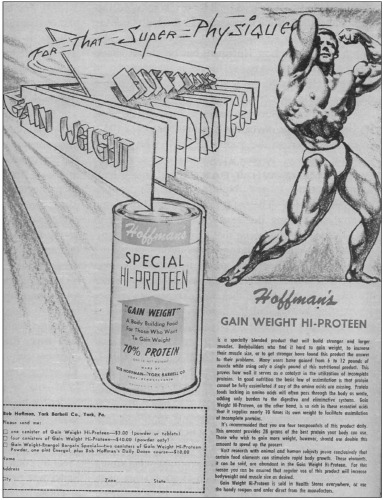
So if protein powder was born among the body building community in Los Angeles, how did it end up in the hands of the average consumer? Re-appropriation of protein supplements to target specific demographics like professional athletes, body builders, or people looking to lose weight, has driven the market in multiple directions. Protein powder was born from a culture obsessed with physical appearance. Now that protein products are becoming more ubiquitous in grocery stores, questions of who has access to such an excessive product and why are they buying it come to mind. Could protein powder be an indicator of larger cultural beauty standards?
Ulterior to the relationship between protein powder, working out and beauty standards, the expansive availability of vegan protein powders may be in response to increased popularity of veganism and vegetarianism. Agriculture and animal production are two of the largest contributors of green-house gases and climate change. In response, research has suggested Americans should reduce meat consumption to discourage animal production (Joyce, et al, 2012).

Being the meat centered culture that America is, concerns of protein deficiency are large. Protein powder then becomes a viable option to help make up any nutritional gaps created by the omission of animal products. This study cannot speak for all American’s, however, so from her on I will be talking about protein powder consumers.
Funny enough, modern vegan powders are not totally unlike the original made back in 1950, soy is still a fairly common additive. The major difference between then and now though, is that people want more than just protein, they want a full serving of vegetables, antioxidant fruits, super food blends, biotin, collagen, vitamins, probiotics—things that would not be in your average hamburger.
My point is, protein powder has become a lot more than just protein, it’s become more of a cultural product in America, and for this study D.C. It is still used by athletes and body builders, but now D.C. residents outside these categories are hoppin’ on the Whey Train, hoping these magical protein powders will transform them as well. A self-awareness of environmental impact, in hand with influences from cultural beauty and fitness paradigms, creates an imaginary necessity for protein powder.
Understanding protein powder is not vital for survival, I would like to reconfigure it as a dietary accessory. Using ethnographic data collected from GNC, Safeway, Whole Foods and CVS, I use the position of protein powder in the store, as well as the availability of natural/conventional powders to generate an idea of the kind of customer these stores are targeting.
So what is my protein powder consumer profile? It seems the person stores are marketing to is affluent, health oriented and body conscious. Quick disclaimer: I only witnessed protein powder being purchased once during my time in the field, so all of my conclusions as to who protein consumers really are, are drawn from observations of the greater environment of each store.
Out in the real world
D.C. residents do purchase protein powder. The fact that specialty stores, like GNC, exist shows there is demand in D.C.; however, I think demand for vegan or ‘natural’ protein powder is growing.

GNC has a limited selection of “healthy” powders, as the majority of their brands contain long lists of unknown (and unpronounceable) substances. The lack of business when I visited the store seems to suggest a decline in the popularity of their products, though I would also posit online markets may reflect a very different reality. These observations from GNC, combined with high prices ranging from $19.99 to $64.99, tells me protein buyers must be of higher economic status. Being located in a business area of D.C., I also suggest GNC’s protein customer is educated and health conscious (because they are buying protein powder).
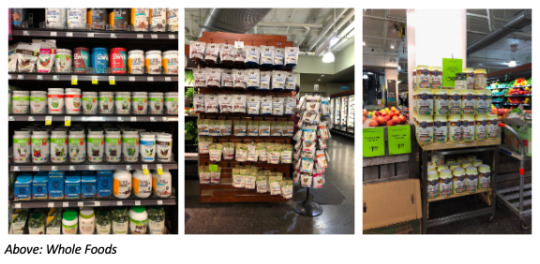
Whole Foods has a growing supply of natural protein powders. The average Whole Foods customer fits the archetype of my consumer—affluent and health conscious with the added bonus of environmental awareness. Whole Foods itself has a reputation for being fairly elite, as suggested by its nickname, “Whole Paycheck.” The high prices, starting at $25.99, of natural protein powder works to limit those who have access to the additive, repositioning protein as a status symbol (and supporting my hypothesized affluency of a protein powder consumer).

Safeway tries to recreate the Whole Foods upper class ambiance by placing protein powder in the ‘natural’ aisle, which stands apart from the rest of the store because of its ‘natural’ wood flooring and organic labels. The aesthetic shift accentuates the segregation of ‘natural’ foods from the rest of the store. Protein powders can only be found in this aisle, and their selection is limited to natural and vegan brands.
Prices did start a little lower, at $16.99, however the large aisles, carts and adjacency to neighborhoods, suggested it is more of family grocery store. Therefore, these prices may still be considered high if two or more people are using the protein product.
The aesthetic separation of the natural aisle works to further emphasize protein powder as a status symbol by mimicking “whole paycheck.” Consumers of natural protein powder are physically and economically separate from the average Safeway shopper.
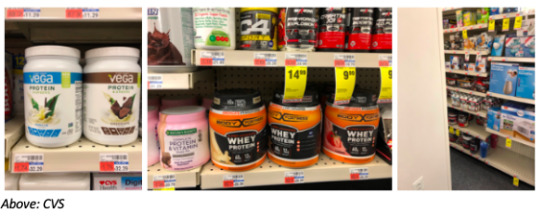
CVS bridges the gap between Whole Foods and Safeway as it has both natural and conventional protein powders, despite its limited selection. Once more, I would like to bring attention to the placement of the conventional powder behind a support beam. This suggests CVS prioritizes the visibility of the natural protein powders. Maybe this means they expect customers who are looking for protein powder to be looking for natural brands. The natural products are consistently more expensive, starting at $23.99, than those that are not, which start at $20.79. The customer who purchases the natural product is likely someone with the resources to do so. Yes, there are the conventional options, but it seems clear that protein powders have taken a turn for the natural and expensive.
Discussion
Looking across the four stores, protein powder is clearly a dietary accessory. Where powders once served a specific purpose for body builders, protein markets have expanded their appeal by incorporating other nutritional additives. High prices limit the accessibility of protein powder, something even greater affected by the even higher prices of natural products. The concept of ‘natural’ seems to be a marketing tool used by stores (with the exception of GNC because they have a more specific weight lifting demographic). “Natural” and “organic” tend to have upper class connotations or affiliations due to price trends (and whole paycheck). Protein powder’s affiliation with body builders may appeal to consumers’ desire to improve their musculature, but I argue this association is too limited now.
The socioeconomic affiliation with “natural” pricing and superadditives advertised on protein powder labels began to appeal to a broader audience. The cosmetic origins of protein continue on today as they aid in achieving cultural ‘fit’ beauty standards. This leads me to believe my Whey Train people are of a middle to upper socioeconomic class who seem to favor plant-based proteins in the interest of improving their health and physique.
Adele Queener
Hall, Daniel and Fair, John. (2004). The Pioneers of Protein. Iron Game History. 8(3), 23-34.
Joyce, A., Dixon, A., Comfort, J. & Hallett, J. (2012). Reducing the Environmental Impact of Dietary Choice: Perspectives from a Behavioral and Social Change Approach. Journal of Environmental and Public Health. Doi:10.1155/2012/978672.
#wholefoods#safeway#cvs#gnc#fourstore#overview#proteinroundup#protein#pro-tein#proteinpowder#chocolate#vanilla#natural#organic#gwu#dc#allaboutfood#anthropology#anth4008#babz#2019
1 note
·
View note